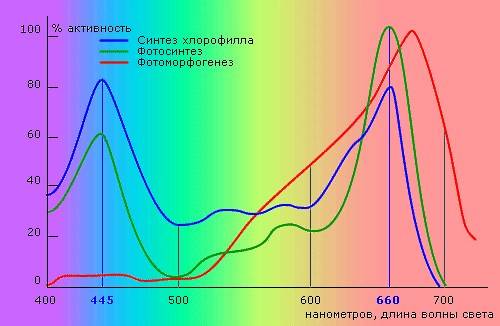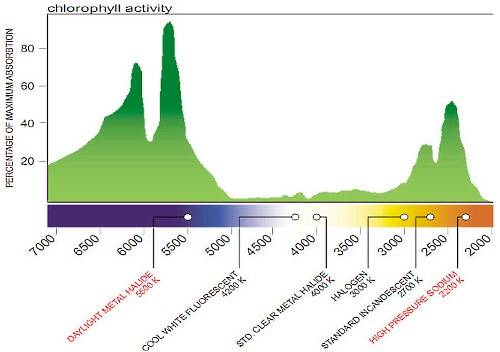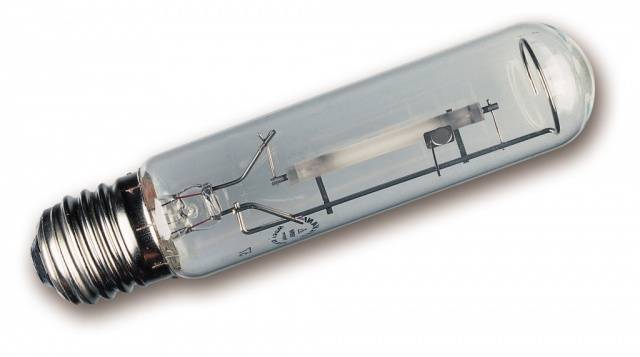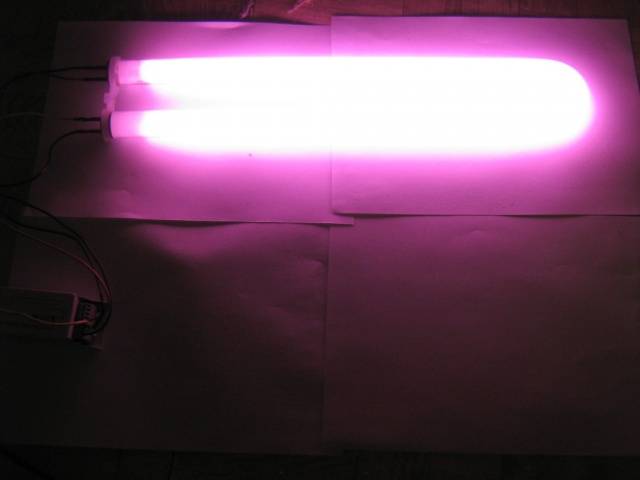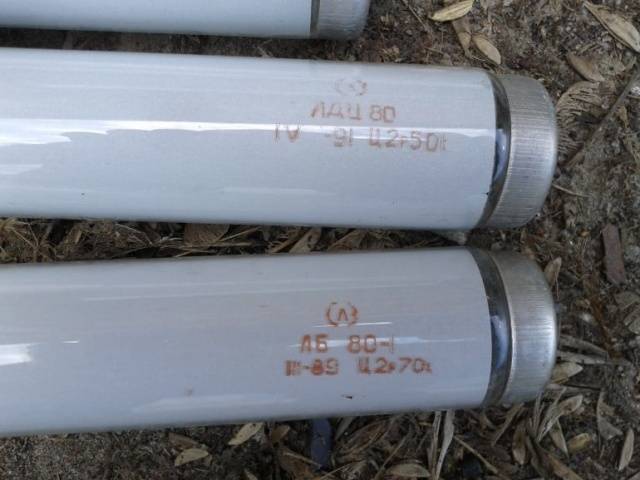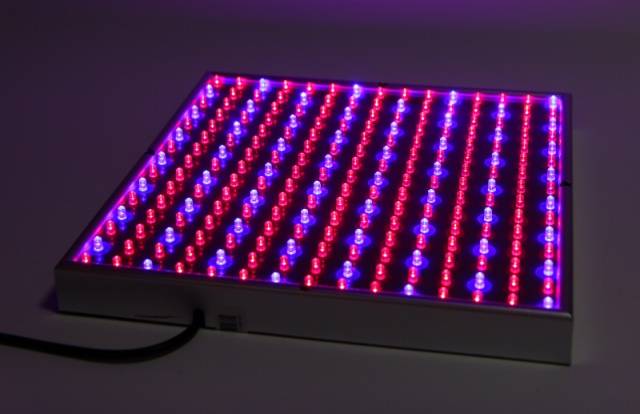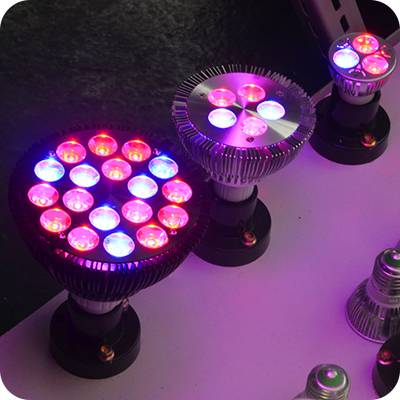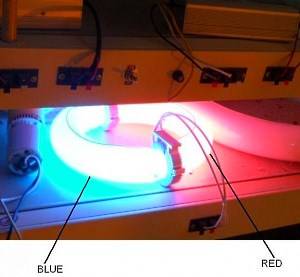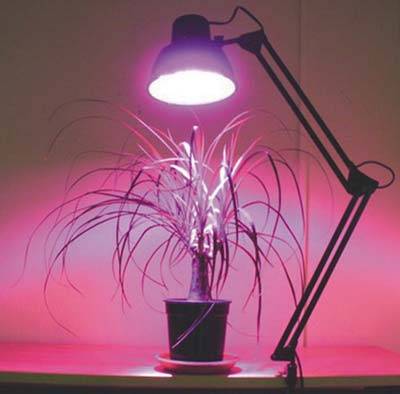Content
Artificial lighting will only benefit the seedlings if the light source is correctly selected. Natural light for plants is most useful, but in early spring it is not enough. Used for supplementary lighting seedling lamp should emit two important spectra: blue and red. It is these colors that are assimilated by plants and affect their development.
Influence of different light spectra on plant development
On the street, green vegetation develops under the sunlight. Waves of different colors and lengths are partially visible to human vision, but all color spectra are important for seedlings:
- The main role in the development of planting material is played by the red and blue light spectrum. The rays help the development of plant cells, the root system, and the production of chlorophyll.
- The orange light is responsible for the future fruiting of indoor crops.
- The yellow and green spectrum, which is completely reflected from the foliage of plants, is considered useless. However, these colors contain the sun's rays, which means that there is little benefit from them.
- Ultraviolet light is harmful to all living things in large quantities. However, small doses of rays are beneficial to the planting material. UV radiation is present in the sun's rays and destroys pathogens of fungal and viral diseases.
- Infrared rays are completely absorbed by plants. The seedlings become lush, green, juicy.
No artificial light source is capable of accommodating all spectra that 100% replace the sun's rays. Usually, when organizing the backlight, the emphasis is on red and blue. However, the best seedling lamps are considered to be those that are capable of emitting white light in addition to the two main spectra, as well as IR and UV rays.
The best sources of artificial light for supplementary lighting of planting material
Even the most expensive lamps for supplementary lighting of seedlings are not able to completely replace natural light. However, without artificial lighting, it is impossible to grow a full-fledged planting material. Optimal when the backlight is combined with natural light. Such results can be achieved by placing seedlings on a windowsill or in a glass greenhouse.
Backlighting helps to grow planting material even in rooms without window openings. Cultures grow under artificial supplementary lighting in the polar night conditions. However, a single white, red, or blue lamp will not be beneficial for seedlings. We need specialized light sources that emit the entire spectrum and beams of different lengths.
Sodium
Gas-discharge sodium lamps for growing seedlings are produced in several modifications. On sale there are models of the domestic manufacturer "Reflax", as well as products of European brands. Gas discharge lamp for backlight seedlings does not harm humans, which allows it to be used in greenhouses and living quarters.
If we focus on models of a domestic manufacturer, then DNaZ with a power of 70 W is suitable for room use.A feature of the product is the presence of a mirror reflector on a glass bulb. The lamp is able to make high-quality illumination of seedlings on a windowsill 1.5 m wide. The reflector creates a large projection angle of light rays and enhances them.
An analogue is DNaT, but the product differs in the absence of a mirror reflector. With the same power of 70 W, the light spot will cover only 1 m of the area with the planting material. Due to the small projection angle, one light bulb will have to be placed for every 1 m.
The considered positive and negative qualities of sodium light sources will help to determine which lamps to use for illuminating seedlings.
Positive sides:
- radiation of a light spectrum suitable for plant development;
- long service life;
- low power consumption.
Negative sides:
- high price;
- a regulator is needed for the backlight;
- large dimensions.
Despite the emission of the most suitable spectrum, blue rays in the glow of a sodium lamp are lacking.
Phytoluminescent
The specialized pink seedling lamp belongs to the range of fluorescent light sources. The glow is well perceived by plants, and all spectra are completely absorbed. Phytoluminescent bulbs from different manufacturers differ in power and application features:
- Osram introduces a light source called Fluora. On 1 m of the area with seedlings, 2 phytolamps with a power of 18 W are used.
- The domestic light source LFU-30 is installed one per 1 m of the length of the shelf with seedlings. Phytolamp power - 30 W.
- The Enrich brand presented a phytolamp, the glow of which is slightly harmful to eyesight. The plus is the presence of a mirror reflector. The downside is a short service life. At 60 W, a lot of heat is generated along with the light.
- Paulmann phytolamps are distinguished by their long service life. The power of the light sources varies from 40 to 100 watts. The advantage is the minimum heat generation.
The main advantage of phytoluminescent lamps is low power consumption, compact size, long service life, as well as emission of spectrum useful for seedlings.
The big disadvantage is the impossibility of using the backlight in a residential area. The pink glow is very irritating to the organs of vision. Phytolamps are best installed in a greenhouse, non-residential room, or covered with reflective screens.
Luminescent
A good energy-saving seedling lamp will come from a fluorescent housekeeper. However, such a light source is inconvenient due to the small area coverage. It is better to hang two long tubular models above the shelves with planting material. The choice of this number is due to the low power of fluorescent lamps. Two tubes are placed from the tops of the seedlings at a distance of 15–35 cm.
The advantage of fluorescent tubes is low cost, efficiency, daylight emission. Disadvantage - they emit a small amount of the red light spectrum. Mercury vapors pose a hazard to humans if the flask breaks.
LEDs and phytolamps
The most economical and safe are LED lamps for seedlings from a set of LEDs. You can even assemble the backlight yourself. You just need to buy red, blue and white LEDs, a power supply and solder the circuit from the parts.
It is easier to give preference to a ready-made LED panel or use a strip. The second option is even more convenient. The LED strip is glued to any support over the planting material along the entire length of the shelf.
Dignity LED backlight in low power consumption, as well as high light emission with low heat generation.The disadvantage is the high cost of lamps, individual LEDs and power supplies.
If we focus on LEDs, then bicolor lamps for seedlings will be the best choice. Phytolamp is an independent light source that is simply inserted into the cartridge. Lamps are produced with a different type of base, as well as differing in power and shape.
Depending on the LEDs used, phytolamps are divided into three groups:
- The red and blue spectrum is emitted by a bicolor seedling lamp, which influences the process of photosynthesis. Light wavelength - 660 and 450 Nm. The direct purpose of the phytolamp is to illuminate young vegetation grown in any conditions.
- Phytolamp multispectrum is distinguished by the presence of additional spectra. Added a white glow as well as a far red light. Radiation of an optimal set of light spectra stimulates the formation of inflorescences and fruiting in adult plants. Phytolamps are suitable for greenhouses and for highlighting indoor flowers when there is a lack of sunlight. Far red light shines through dense foliage. Multispectrum phytolamps are good for illuminating plants at a high planting density.
- Phytolamps have a wide range - a full range. Light sources are produced with a power of 15 and 36 watts. The lamp is considered universal, but the bicolor model is inferior in efficiency, as well as in the spectrum peaks. The emitted artificial light is the best suited to natural light. Phytolamps are used to illuminate crops in a dark room throughout the growing season - from sowing to harvesting.
When the question arises, which lamp is better to illuminate the seedlings, preference is given to a bicolor light source.
Induction
Induction bulbs are still little used in everyday life, but they are considered an excellent option for artificial lighting. A special feature is the emission of two spectra - blue and red. The advantage of bulbs lies in the economy, versatility of the light spectrum, suitable for all types of seedlings. Maximum heating temperature during glow - 75aboutFROM.
Lack of backlighting with a conventional incandescent lamp
Novice vegetable growers are interested in the question of whether it is possible to illuminate the seedlings with an ordinary lamp with a tungsten filament. As an independent source of illumination, it is impossible. A tungsten coil transforms only 5% of the energy to create a luminous flux. The yellow-orange glow is not assimilated by plants. The generated large amount of heat overheats the plants and burns the leaves. If it is necessary to raise the temperature, the bulbs can be paired with other light sources.
The video shows lamps for illumination:
The backlight must be efficient, economical and safe. Lamps are selected according to this principle.
